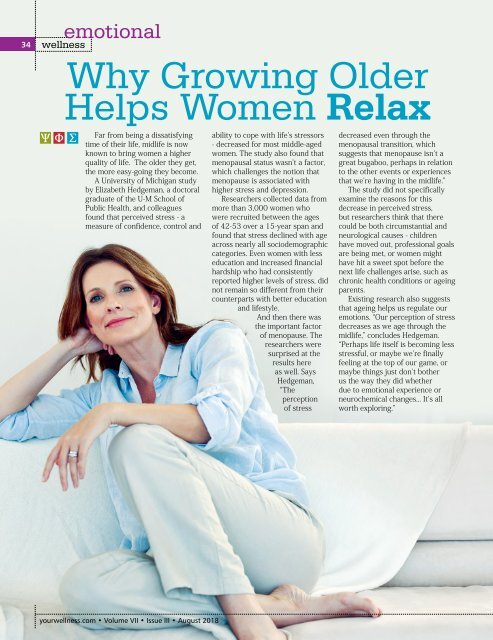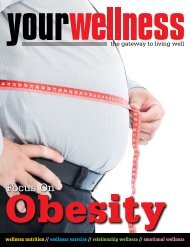Create successful ePaper yourself
Turn your PDF publications into a flip-book with our unique Google optimized e-Paper software.
emotional<br />
34 wellness<br />
Why Growing Older<br />
Helps Women Relax<br />
Far from being a dissatisfying<br />
time of their life, midlife is now<br />
known to bring women a higher<br />
quality of life. The older they get,<br />
the more easy-going they become.<br />
A University of Michigan study<br />
by Elizabeth Hedgeman, a doctoral<br />
graduate of the U-M School of<br />
Public Health, and colleagues<br />
found that perceived stress - a<br />
measure of confidence, control and<br />
ability to cope with life's stressors<br />
- decreased for most middle-aged<br />
women. The study also found that<br />
menopausal status wasn't a factor,<br />
which challenges the notion that<br />
menopause is associated with<br />
higher stress and depression.<br />
Researchers collected data from<br />
more than 3,000 women who<br />
were recruited between the ages<br />
of 42-53 over a 15-year span and<br />
found that stress declined with age<br />
across nearly all sociodemographic<br />
categories. Even women with less<br />
education and increased financial<br />
hardship who had consistently<br />
reported higher levels of stress, did<br />
not remain so different from their<br />
counterparts with better education<br />
and lifestyle.<br />
And then there was<br />
the important factor<br />
of menopause. The<br />
researchers were<br />
surprised at the<br />
results here<br />
as well. Says<br />
Hedgeman,<br />
“The<br />
perception<br />
of stress<br />
decreased even through the<br />
menopausal transition, which<br />
suggests that menopause isn't a<br />
great bugaboo, perhaps in relation<br />
to the other events or experiences<br />
that we're having in the midlife.”<br />
The study did not specifically<br />
examine the reasons for this<br />
decrease in perceived stress,<br />
but researchers think that there<br />
could be both circumstantial and<br />
neurological causes - children<br />
have moved out, professional goals<br />
are being met, or women might<br />
have hit a sweet spot before the<br />
next life challenges arise, such as<br />
chronic health conditions or ageing<br />
parents.<br />
Existing research also suggests<br />
that ageing helps us regulate our<br />
emotions. “Our perception of stress<br />
decreases as we age through the<br />
midlife,” concludes Hedgeman.<br />
“Perhaps life itself is becoming less<br />
stressful, or maybe we're finally<br />
feeling at the top of our game, or<br />
maybe things just don't bother<br />
us the way they did whether<br />
due to emotional experience or<br />
neurochemical changes... It's all<br />
worth exploring.”<br />
yourwellness.com • Volume VII • Issue III • <strong>August</strong> <strong>2018</strong>
















